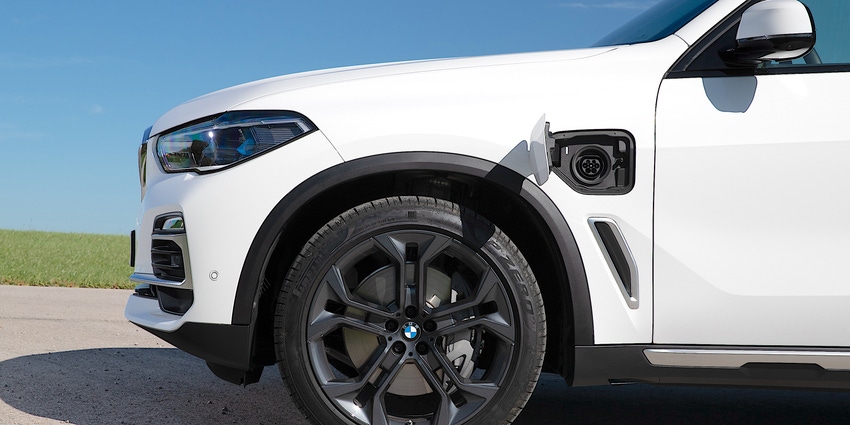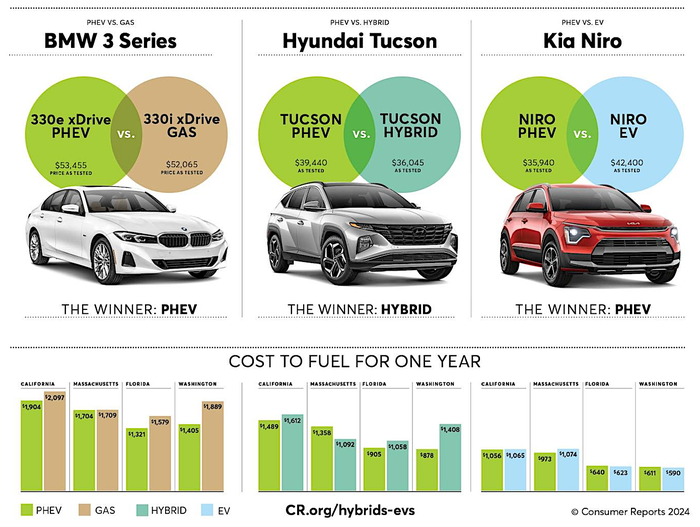'Consumer Reports' Research Backs Plug-In Hybrids
Plug-in hybrid-electric vehicles are an efficient solution to EV shortcomings.
March 13, 2024

At a Glance
- PHEV sales were up 60 percent in 2023
- Plug-in hybrids are quicker and quieter than their gas counterparts
The auto industry is shifting toward an all-electric vehicle end game, but along the way it, and we, are encountering obstacles. The supply of raw materials, the supply of batteries, and the availability of reliable, easy-to-use public fast charging stations have all blunted EV sales growth.
Plug-in hybrid-electric vehicles help avoid these issues while letting drivers make typical daily trips on electric-only power while having the ability to rely on gas power for longer drives and when they aren’t able to plug in for a recharge.
This has been one reason why Toyota has continued to press its hybrid strategy, and now Consumer Reports has found that the market agrees. According to the organization’s analysis of vehicle sales, PHEV sales grew 60 percent in 2023, outpacing the 50 percent sales growth of battery EVs.
Further, CR’s testing of more than a dozen new PHEVs found they deliver a better experience than the gas-powered versions of the same models. The organization says that most PHEVs are quicker, quieter, and more satisfying to drive, citing the example of hybrid stalwart Toyota’s RAV4 Prime compact crossover SUV.
“Figuring out if a PHEV is right for you will probably take a bit more research up front. But for many drivers, PHEVs will save you money over the long run when compared with a gas, hybrid, or electric vehicle,” says Jake Fisher, CR’s senior director of automotive testing. “In most cases, the more you plug in a PHEV, the more money you’ll save.”

CR calculated for drivers who put 40 miles a day on their cars, plug in nightly, and take four 500-mile road trips per year. CONSUMER REPORTS
Previous research has shown that most PHEV drivers treat them as regular hybrids and do not usually plug them in, so they lose the benefit of being able to do daily driving gasoline-free. Consumer Reports is aiming to change that, providing calculators and research tools on CR.org to help consumers navigate the choices and differences between various models to pick one that best suits their driving requirements. Additionally, they’ve added ratings and data for PHEVs to the Consumer Reports Electrified Vehicles Hub, in addition to hybrids and EVs.
One of the tools is an energy cost calculator that compares models side-by-side to determine which is most cost-effective. The Electric Vehicle Savings Finder identifies all available tax credits each vehicle is eligible for and what additional local rebates are available, so shoppers can see the actual purchase price of PHEVs when comparing their prices to gas models.
For its own rating system, CR has changed its scoring rubric for PHEVs so that fuel economy scores are now based on the overall fuel economy from CR’s testing (which is done in charge-sustaining mode that doesn’t employ the stored power in the battery). Then that battery EV range is added on as a bonus.
They’ve also added a new PHEV Usability rating to assess PHEV-specific controls and displays such as electric-only range, and the ease of operating in electric mode. This helps shoppers identify which PHEV will likely work best for them. CR has also added Charging Ease and App functionality ratings used in evaluating EVs, to its PHEV scores too.
About the Author(s)
You May Also Like



